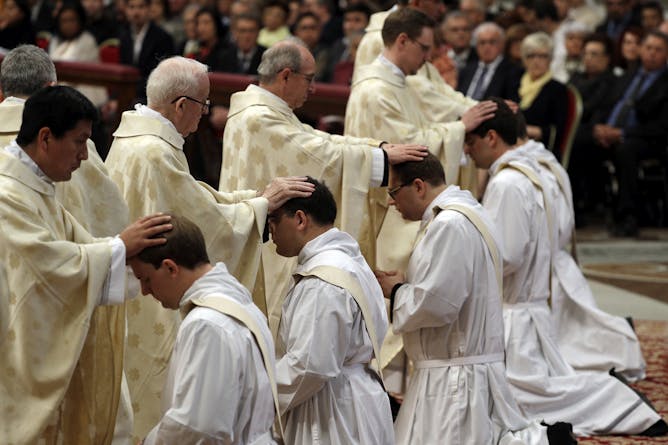|
|
|
Editor's note
|
|
The recent Pennsylvania grand jury report revealing widespread sexual abuse by priests has led to considerable turmoil in the Catholic Church. Pope Francis faces calls for his resignation over allegations of a cover-up. One question being asked is whether mandatory priestly celibacy is at the root of the crisis. Kim Haines-Eitzen, a scholar of early Christianity, writes that priests weren’t always celibate – and explains what led
to the shift.
Have you ever wondered if someone you were interacting with online was authentic – or a Russian troll? Social media scholars Savvas Zannettou and Jeremy Blackburn explain some clear and objective ways that propaganda-spewing trolls behave, so that you can pick them out from the crowd of regular internet users.
Sociologist Ted Thornhill wanted to know if black activists were getting a fair shot in the college admissions process. He sent out hundreds of fictitious inquiry emails to see how activists fared compared to black students who expressed other interests. What he found is that black students who talk about racial justice are treated differently by admissions professionals.
|
Kalpana Jain
Senior Religion + Ethics Editor
|

|
|
Top stories
|

New priests being ordained during a ceremony led by Pope Francis in St. Peter’s Basilica at the Vatican, when they take vows, including to remain celibate.
AP Photo/Andrew Medichini
Kim Haines-Eitzen, Cornell University
Early Christians were open to marriage for priests. It wasn't until the 12th century that celibacy became mandatory in the Catholic Church.
|

They may look similar, but online trolls act differently.
Daren Woodward/Shutterstock.com
Savvas Zannettou, Technological University of Cyprus; Jeremy Blackburn, University of Alabama at Birmingham
Some behaviors might help tell propaganda-spewing trolls apart from regular internet users, but the main protection is for people to think more critically about online information.
|

Black students who express an interest in racial justice are less likely to get a response from predominantly white, private liberal arts colleges, new research shows.
AshTproductions/www.shutterstock.com
Ted Thornhill, Florida Gulf Coast University
New research by sociologist Ted Thornhill shows that black students who indicate they plan to fight for racial justice are more likely to be ignored by white admissions counselors.
|
Politics + Society
|
-
Max Pensky, Binghamton University, State University of New York; Nadia Rubaii, Binghamton University, State University of New York
The evidence in the report is compelling, but experts explain there are many barriers to global leaders taking action.
-
John Rennie Short, University of Maryland, Baltimore County
The more undemocratic tendencies of the US electoral system are growing stronger. As the midterm campaign season enters its final stage, it turns out that some votes count more than others.
|
|
Economy + Business
|
-
Anthony Frederick Lucas, University of Nevada, Las Vegas
A gaming industry expert explains how casinos' ability to hide the price of a slot spin ensures a reliable stream of revenue from even the savviest of gamblers.
-
Benjamin Lawrence, Georgia State University
Checkout charity research suggests that it can boost sales and doesn't ward off customers who don't contribute.
|
|
|
|
|
|
Trending on site
|
-
Tim Logan, Texas A&M University
A weather expert explains where petrichor – that pleasant, earthy scent that accompanies a storm's first raindrops – comes from.
-
Seth Lewis, University of Oregon; Efrat Nechushtai, Columbia University
Google News does not differentiate search results according to users' politics – but it does favor mainstream news sites, which are seen as leaning left, and doesn't clearly disclose how its algorithms work.
-
Satchin Panda, University of California San Diego
You've heard the adage, you are what you eat. But a new study suggests that you are 'when' you eat may be more accurate. Restricting eating times can keep chronic diseases at bay and ward off obesity.
|
|
Today’s chart
|
-

 |
Jeffrey Kucik
University of Arizona
|
| | | |
| |
|
|
|
|
|
|
|